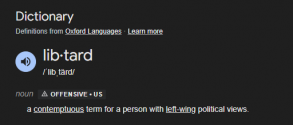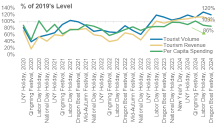Well, that is why I said the "Chinese equivalent".
I view Chinese "libtards" as individuals characterized by:
-skepticism of the CPC both as the ruling government and a system of government in China
-lack of recognition of geopolitical and strategic realities in context of contemporary Chinese priorities
-overvaluing of short term sociocultural events that can be understood as "progressive" from a western lens
-adherence to predominantly popular western sociocultural or economic lenses in viewing China as a whole
-lack of general long term planning awareness in relation to national goals
Now, there's nothing wrong with being a "Chinese libtard" it basically just means they are a bit strategically vacuous and geopolitically asleep, while championing socially progressive causes and western socioeconomic theories in a manner that seems disproportionate with the current major challenges which China actually faces.
That said I also do agree that coolgod of course shitposts not infrequently.
But he isn't wrong to call Zichen a Chinese libtard.
A quick search:
That he does not come off as hawkish or as 'geopolitically aware' as you'd like him to on Twitter is not at all a reflection of his 'misappreciation' of the things you list.
Like, they're not talking to convince Matt Gallagher when they invite them to China to have a look.
It would be presumptuous to believe that Zichen's public persona as it relates to his Twitter presence would be entirely aligned with what he does or does not believe with respect to your list of grievances.
Unless you've talked to him personally, your accusations mean nothing.
Deflation is not good or bad, it's just a symptom, and in this particular case a symptom of decreased consumer confidence, of which the root cause is a decrease or at least stagnation of people's wealth due to the property slump. When people feel insecure about their financial future, they won't spend freely. Printing money alone won't solve this problem, as it can either cause inflation which eats away at people's wealth as well, or if people feel very insecure then they'll just save the money instead of investing it (e.g. Japan).
The only way out of this is by increasing productivity, not measured in currency as that can be affected by money supply, but in terms of economic output. Move into higher value added industries, both in manufacturing and services, then you can increase money supply without causing inflation because the inflation will be eaten away by higher productivity. Japan has printed an ungodly amount of money the past few decades and it hasn't helped their deflation nor, more importantly, their economy, as after COVID they finally got inflation but their economy is still in the gutters. This is all because they never moved up in productivity, and IMO China has successfully identified the root cause and is correctly ignoring deflation and addressing the root cause instead.
Stimulus can be useful, but IMO it's best used with good timing and is well targeted. There is no free lunch. Money printing is just a form of wealth transfer, and when China does launch some stimulus measures it needs to make sure that it's well targeted at promoting the most productive industries and not be sunk into unproductive ones like real estate again.
You cannot simply blame the confidence issue (By the way I seem to recall a lot of pushback against my characterization of poor confidence about a year ago -
@Blitzo any pushback today?) as part of property slump because the real impact to consumer confidence happened in Shanghai lockdowns - a good 18 months after three red lines and a good 9 months after we started seeing property declines.
The problem today is that there is a negative narrative that is starting to perpetuate - there is increased distrust of government competence - look no further than the latest cooking oil scandal (so called "透支中央政府的公信度“). In other words, a lot of the political goodwill the government has built up in the past years (anti-corruption, poverty alleviation, and certainly handling COVID well in 2020/2021) has been deleted as a result of the latest setbacks.
Is it fair? Maybe not, but the Chinese population is very demanding.
I
fully expect this to be exacerbated by info ops from so called 'foreign hostile forces'. But like I said, propaganda only works well when there is a semblance of truth - unfortunately, the reality feels 'kind of bad'.
I don't disagree with what you've stated with respect to higher value added industries. But that is a handwavy argument in this specific case - the
long term solutions (moving to higher value added industries) should not be conflated with
pressing issue today (risk of a debt/deflation loop) driven by this lack of confidence.
People love to point back to the 1998 'pain' of SOE layoffs - but guess what WTO entry + export led growth was more than sufficient to offset the pain. That is no longer available as an option today especially with virtual tariff hikes by the US and a brewing trade dispute with EU.
Chinese trade surplus is already at all-time highs - its difficult to see net export as a driver to drive the domestic economy going forward especially with Trump being a high likelihood. YTD this has been the biggest 'surprise' to the upside' - but going forward, Net Exports (NX) is impulse is likely to be flat at best and down at worst.
As for 'G' - government spending - well, local government budgets are tight AF with land sales down significantly. There is a reason why many local governments are collecting back taxes from 30 years ago - they're tight with cash. G is also likely to be flat at best and down at worst.
That brings us to I - YTD the fiscal spending (3.9 trillion of special purpose bonds + 1trln of ultra long term govnt' bonds) have been significantly behind schedule - this is because governments have had issues finding infrastructure projects that meet the ROI threshold. Therefore 'I' is also unlikely to drive faster GDP growth.
This brings us to consumption, as an example, current real state sales (new sales + inventory destocking) is already running
below the real demand from continued urbanization/upgrading demand - meaning people are waiting on the sidelines even if they have a real need to buy/upgrade. This is an output gap. And this is why the PBoC has already launched a pilot 300+200bln relending scheme for local governments to acquire inventory - this is realization that they 'need to do something' - but they just haven't realized it is insufficient.
I recognized this issue quite early on and was quite adamant about retail sales growth in 2023 being no higher than 8% - I suggest people search my history of posts on this issue and the rationale of those who were adamant about 15% retail sales growth in 2023.
I fully agree that dumping more money into RE is not a solution, there is no reason why there should not be more healthcare spending and better social security:
- What explains the substantial difference of social security benefits of Party officials in China vs. non Government workers? Isn't this supposed to be a Party by the people and for the people? ("All pigs are equal, some are more equal than others")
- Despite 95%+ coverage, a cancer diagnosis in China can still bankrupt a family even with insurance reimbursements, and this is only for drugs included in the formulary. The formulary of drugs included in National Drug Reimbursement List (NDRL) is a
fraction of the drugs approved by NMPA and approved for sale in China
- Why aren't there more SOEs being transferred into social security funds? Why do they operate like local fiefdoms of local government officials? Why do they not pay out more dividends to SASAC to be used in general government budgets to pay for the two points above?
There are plenty of solutions to all of the issues China faces today, and the great thing about these issues is that they are only issues from a "developed country" status - meaning I am evaluating China in terms of "what it can be" (unburdened by what has been) - so that in of itself is a good thing.
However, execution at local / ministeral levels have remained challenging given a litany of coordination issues.
Chinese left is much more traditional to the original idea where you have high government regulation and re-distribution of wealth and control of means of production without any implication on gay marriage or gun control.
All the things I suggest: more equitable social benefits, better healthcare coverage, more supervision on use of state assets - are
fully consistent with what you suggest in terms of 'redistribution of wealth'.


